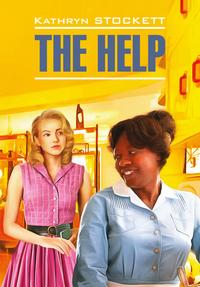Kitabı oku: «The Help / Прислуга. Книга для чтения на английском языке», sayfa 4
At one o’clock, Miss Celia comes in the kitchen and says she’s ready for her first cooking lesson. She settles on a stool. She’s wearing a tight red sweater and a red skirt and enough makeup to scare a hooker32.
“What you know how to cook already?” I ask.
She thinks this over, wrinkling her forehead. “Maybe we could just start at the beginning.”
“Must be something you know. What your mama teach you growing up?”
She looks down at the webby feet of her stockings, says, “I can cook corn pone.”
I can’t help but laugh. “What else you know how to do sides corn pone?”
“I can boil potatoes.” Her voice drops even quieter. “And I can do grits. We didn’t have electric current out where I lived. But I’m ready to learn right. On a real stovetop.”
Lord. I’ve never met a white person worse off than me except for crazy Mister Wally, lives behind the Canton feed store and eats the cat food.
“You been feeding your husband grits and corn pone ever day?”
Miss Celia nods. “But you’ll teach me to cook right, won’t you?”
“I’ll try,” I say, even though I’ve never told a white woman what to do and I don’t really know how to start. I pull up my stockings, think about it. Finally, I point to the can on the counter.
“I reckon if there’s anything you ought a know about cooking, it’s this.”
“That’s just lard, ain’t it?”
“No, it ain’t just lard,” I say. “It’s the most important invention in the kitchen since jarred mayonnaise.”
“What’s so special about” – she wrinkles her nose at it – “pig fat?”
“Ain’t pig, it’s vegetable.” Who in this world doesn’t know what Crisco is? “You don’t have a clue of all the things you can do with this here can.”
She shrugs. “Fry?”
“Ain’t just for frying. You ever get a sticky something stuck in your hair, like gum?” I jackhammer my finger on the Crisco can. “That’s right, Crisco. Spread this on a baby’s bottom, you won’t even know what diaper rash is.” I plop three scoops in the black skillet. “Shoot, I seen ladies rub it under they eyes and on they husband’s scaly feet.”
“Look how pretty it is,” she says. “Like white cake frosting.”
“Clean the goo from a price tag, take the squeak out a door hinge. Lights get cut off, stick a wick in it and burn it like a candle.”
I turn on the flame and we watch it melt down in the pan. “And after all that, it’ll still fry your chicken.”
“Alright,” she says, concentrating hard. “What’s next?”
“Chicken’s been soaking in the buttermilk,” I say. “Now mix up the dry.33” I pour flour, salt, more salt, pepper, paprika, and a pinch of cayenne into a doubled paper sack.
“Now. Put the chicken parts in the bag and shake it.”
Miss Celia puts a raw chicken thigh in, bumps the bag around. “Like this? Just like the Shake ’n Bake commercials on the tee-vee?”
“Yeah,” I say and run my tongue up over my teeth because if that’s not an insult, I don’t know what is. “Just like the Shake ’n Bake.” But then I freeze. I hear the sound of a car motor out on the road. I hold still and listen. I see Miss Celia’s eyes are big and she’s listening too. We’re thinking the same thing: What if it’s him and where will I hide?
The car motor passes. We both breathe again.
“Miss Celia,” I grit my teeth, “how come you can’t tell your husband about me? Ain’t he gone know when the cooking gets good?”
“Oh, I didn’t think of that! Maybe we ought to burn the chicken a little.”
I look at her sideways. I ain’t burning no chicken. She didn’t answer the real question, but I’ll get it out of her soon enough.
Real careful, I lay the dark meat in the pan. It bubbles up like a song and we watch the thighs and legs turn brown. I look over and Miss Celia’s smiling at me.
“What? Something on my face?”
“No,” she says, tears coming up in her eyes. She touches my arm. “I’m just real grateful you’re here.”
I move my arm back from under her hand. “Miss Celia, you got a lot more to be grateful for than me.”
“I know.” She looks at her fancy kitchen like it’s something that tastes bad. “I never dreamed I’d have this much.”
“Well, ain’t you lucky34.”
“I’ve never been happier in my whole life.”
I leave it at that. Underneath all that happy, she sure doesn’t look happy.
* * *
That night, I call Aibileen.
“Miss Hilly was at Miss Leefolt’s yesterday,” Aibileen says. “She ask if anybody knew where you was working.”
“Lordy, she find me out there, she ruirn it for sure.” It’s been two weeks since the Terrible Awful Thing I did to that woman. I know she’d just love to see me fired on the spot.
“What Leroy say when you told him you got the job?” Aibileen asks.
“Shoot. He strut around the kitchen like a plumed rooster cause he in front a the kids,” I say. “Act like he the only one supporting the family and I’m just doing this to keep my poor self entertained. Later on though, we in bed and I thought my big old bull for a husband gone cry.”
Aibileen laughs. “Leroy got a lot a pride.”
“Yeah, I just got to make sure Mister Johnny don’t catch up with me.”
“And she ain’t told you why she don’t want him to know?”
“All she say is she want him to think she can do the cooking and the cleaning herself. But that ain’t why. She hiding something from him.”
“Ain’t it funny how this worked out. Miss Celia can’t tell nobody, else it’ll get back to Mister Johnny. So Miss Hilly won’t find out, cause Miss Celia can’t tell nobody. You couldn’t a fixed it up better yourself.”
“Mm-hmm” is all I say. I don’t want to sound ungrateful, since Aibileen’s the one who got me the job. But I can’t help but think that I’ve just doubled my trouble, what with Miss Hilly and now Mister Johnny too.
“Minny, I been meaning to ask you.” Aibileen clears her throat. “You know that Miss Skeeter?”
“Tall one, used to come over to Miss Walters for bridge?”
“Yeah, what you think about her?”
“I don’t know, she white just like the rest of em. Why? What she say about me?”
“Nothing about you,” Aibileen says. “She just… a few weeks ago, I don’t know why I keep thinking about it. She ask me something. Ask do I want to change things. White woman never asked —”
But then Leroy stumbles in from the bedroom wanting his coffee before his late shift. “Shoot, he’s up,” I say. “Talk quick.”
“Naw, never mind. It’s nothing,” Aibileen says.
“What? What’s going on? What that lady tell you?”
“It was just jabber. It was nonsense.”
Chapter 4
My first week at Miss Celia’s, I scrub the house until there isn’t a dust rag or a stripped sheet or even a run stocking left to wipe with. Second week, I scrub the house again because it’s like the dirt grew back. Third week, I am satisfied and settle in my ways.
Every day, Miss Celia looks like she just can’t believe I’ve come back to work. I’m the only thing that interrupts all that quiet around her. My house is always full of five kids and neighbors and a husband. Most days when I come in to Miss Celia’s, I am grateful for the peace.
My housekeeping tasks fall on the same day for every job I take: on Monday, I oil up the furniture. Tuesday, I wash and iron the damn sheets, the day I hate. Wednesday is for scrubbing the bathtub real good even though I wipe it down every morning. Thursday is for polishing floors and sucking rugs, minding the antique ones with a hand broom so they don’t thread. Friday is heavy cooking for the weekend and what-have-you. And every day is mopping, washing clothes and ironing shirts so they don’t go getting out of hand, and generally keeping things clean. Silver and windows, they’re as needed. Since there aren’t any kids to look after, there’s ample time left for Miss Celia’s so-called cooking lesson.
Miss Celia never does any entertaining, so we just fix whatever she and Mister Johnny are having for supper: pork chops, fried chicken, roast beef, chicken pie, lamb rack, baked ham, fried tomatoes, mashed potatoes, plus the vegetables. Or at least I cook and Miss Celia fidgets, looking more like a five-year-old than the rich lady paying my rent. When the lesson’s over, she rushes back to laying down. In fact, the only time Miss Celia walks ten feet is to come in the kitchen for her lesson or to sneak upstairs every two or three days, up in the creepy rooms.
I don’t know what she does for five minutes on the second floor. I don’t like it up there though. Those bedrooms should be stacked full of kids laughing and hollering and pooping up the place. But it’s none of my business what Miss Celia does with her day, and ask me, I’m glad she’s staying out of my way. I’ve followed ladies around with a broom in one hand and a trash can in the other trying to keep up with their mess. As long as she stays in that bed, then I’ve got a job. Even though she has zero kids and nothing to do all day, she is the laziest woman I’ve ever seen. Including my sister Doreena who never lifted a royal finger growing up because she had the heart defect that we later found out was a fly on the X-ray machine.
And it’s not just the bed. Miss Celia won’t leave the house except to get her hair frosted and her ends trimmed. So far, that’s only happened once in the three weeks I’ve been working. Thirty-six years old and I can still hear my mama telling me, It ain’t nobody’s business. But I want to know what that lady’s so scared of outside this place.
* * *
Every payday, I give Miss Celia the count. “Ninety-nine more days till you tell Mister Johnny bout me.”
“Golly, the time’s going by quick,” she’ll say with kind of a sick look.
“Cat got on the porch this morning, bout give me a cadillac arrest35 thinking it was Mister Johnny.”
Like me, Miss Celia gets a little more nervous the closer we get to the deadline. I don’t know what that man will do when she tells him. Maybe he’ll tell her to fire me.
“I hope that’s enough time, Minny. Do you think I’m getting any better at cooking?” she says, and I look at her. She’s got a pretty smile, white straight teeth, but she is the worst cook I have ever seen.
So I back up and teach her the simplest things because I want her to learn and learn it fast. See, I need her to explain to her husband why a hundred-and-sixty-five-pound Negro woman has keys to his house. I need him to know why I have his sterling silver and Miss Celia’s zillion-karat ruby earrings in my hand every day. I need him to know this before he walks in one fine day and calls the police. Or saves a dime and takes care of business himself.
“Get the ham hock out, make sure you got enough water in there, that’s right. Now turn up the flame. See that little bubble there, that means the water’s happy.”
Miss Celia stares down into the pot like she’s looking for her future. “Are you happy, Minny?”
“Why you ask me funny questions like that?”
“But are you?”
“Course I’s happy. You happy too. Big house, big yard, husband looking after you.” I frown at Miss Celia and I make sure she can see it. Because ain’t that white people for you, wondering if they are happy enough.
And when Miss Celia burns the beans, I try and use some of that self-control my mama swore I was born without. “Alright,” I say through my teeth, “we’ll do another batch fore Mister Johnny get home.”
Any other woman I’ve worked for, I would’ve loved to have had just one hour of bossing them around, see how they like it. But Miss Celia, the way she stares at me with those big eyes like I’m the best thing since hairspray in the can, I almost rather she’d order me around like she’s supposed to. I start to wonder if her laying down all the time has anything to do with her not telling Mister Johnny about me. I guess she can see the suspicious in my eye too, because one day, out of the blue36 she says:
“I get these nightmares a lot, that I have to go back to Sugar Ditch and live! That’s why I lay down so much.” Then she nods real fast, like she’s been rehearsing this. “Cause I don’t sleep real well at night.”
I give her a stupid smile, like I really believe this, and go back to wiping the mirrors.
“Don’t do it too good. Leave some smudges.”
It’s always something, mirrors, floors, a dirty glass in the sink or the trash can full. “We’ve got to make it believable,” she’ll say and I find myself reaching for that dirty glass a hundred times to wash it. I like things clean, put away.
* * *
“I wish I could tend to that azalea bush out there,” Miss Celia says one day. She’s taken to laying on the couch while my stories are on, interrupting the whole time. I’ve been tuned in to The Guiding Light for twenty-six years, since I was ten years old and listening to it on Mama’s radio.
A Dreft commercial comes on and Miss Celia stares out the back window at the colored man raking up the leaves. She’s got so many azalea bushes, her yard’s going to look like Gone With the Wind37 come spring. I don’t like azaleas and I sure didn’t like that movie, the way they made slavery look like a big happy tea party. If I’d played Mammy38, I’d of told Scarlett to stick those green draperies up her white little pooper. Make her own damn man-catching dress.
“And I know I could make that rose bush bloom if I pruned it back,” Miss Celia says. “But the first thing I’d do is cut down that mimosa tree.”
“What’s wrong with that tree?” I press the corner of my iron into Mister Johnny’s collar-point. I don’t even have a shrub, much less a tree, in my entire yard.
“I don’t like those hairy flowers.” She gazes off like she’s gone soft in the head. “They look like little baby hairs.”
I get the creepers with her talking that way. “You know about flowers?”
She sighs. “I used to love to tend to my flowers back in Sugar Ditch. I learned to grow things hoping I could pretty up all that ugliness.”
“Go head outside then,” I say, trying not to sound too excited. “Take some exercise. Get some fresh air.” Get out a here.
“No,” Miss Celia sighs. “I shouldn’t be running around out there. I need to be still.”
It’s really starting to irritate me how she never leaves the house, how she smiles like the maid walking in every morning is the best part of her day. It’s like an itch. Every day I reach for it and can’t quite scratch it. Every day, it itches a little worse. Every day she’s there.
“Maybe you ought to go make some friends,” I say. “Lot a ladies your age in town.”
She frowns up at me. “I’ve been trying. I can’t tell you the umpteen times I’ve called those ladies to see if I can help with the Children’s Benefit or do something from home. But they won’t call me back. None of them.”
I don’t say anything to this because ain’t that a surprise. With her bosoms hanging out and her hair colored Gold Nugget.
“Go shopping then. Go get you some new clothes. Go do whatever white women do when the maid’s home.”
“No, I think I’ll go rest awhile,” she says and two minutes later I hear her creeping around upstairs in the empty bedrooms.
The mimosa branch knocks against the window and I jump, burn my thumb. I squeeze my eyes shut to slow my heart. Ninety-four more days of this mess and I don’t know how I can take a minute more.
“Mama, fix me something to eat. I’m hungry.” That’s what my youngest girl, Kindra, who’s five, said to me last night. With a hand on her hip and her foot stuck out.
I have five kids and I take pride that I taught them yes ma’am and please before they could even say cookie.
All except one.
“You ain’t having nothing till supper,” I told her.
“Why you so mean to me? I hate you,” she yelled and ran out the door.
I set my eyes on the ceiling because that’s a shock I will never get used to, even with four before her. The day your child says she hates you, and every child will go through the phase, it kicks like a foot in the stomach.
But Kindra, Lord. It’s not just a phase I’m seeing. That girl is turning out just like me.
I’m standing in Miss Celia’s kitchen thinking about last night, what with Kindra and her mouth, Benny and his asthma, my husband Leroy coming home drunk two times last week. He knows that’s the one thing I can’t stand after nursing my drunk daddy for ten years, me and Mama working ourselves to death so he had a full bottle. I guess I ought to be more upset about all this, but last night, as an I’m sorry, Leroy came home with a sack of early okra. He knows it’s my favorite thing to eat. Tonight I’m going to fry up that okra in some cornmeal and eat like my mama never let me.
That’s not the only treat to my day either. It’s October first and here I am peeling peaches. Mister Johnny’s mama brought back two crates from Mexico, heavy as baseballs. They are ripe and sweet and like cutting through butter. I don’t take charity from white ladies because I know they just want me to owe them. But when Miss Celia told me to take a dozen peaches home I pulled out a sack and plopped twelve right in. When I get home tonight, I’m eating fried okra for supper and peach cobbler for dessert.
I’m watching the long, fuzzy peel fold down into Miss Celia’s basin, paying no mind at all to the driveway. Usually when I’m standing at her kitchen sink, I map out my getaway from Mister Johnny. The kitchen’s the best room for it because the front window looks out to the street. Tall azalea bushes hide my face, but I can see through enough to spot an approacher. If he came in the front door, the back door would escape me into the garage. If he came in the back, I could slip out the front. Another door in the kitchen leads out to the backyard, just in case. But what with the juice running down my hand and me nearabout drunk on the butter smell, I am lost in a peach-peeling reverie. I don’t even notice the blue truck pull in.
The man’s made it halfway up the walk by the time I look up. I catch a sliver of a white shirt, the variety of which I’m used to ironing every day, and the leg of a pair of khaki pants like I hang up in Mister Johnny’s closet. I choke on a yelp. My knife clatters in the sink.
“Miss Celia!” I dash into her bedroom. “Mister Johnny home!”
Miss Celia jumps out of bed faster than I’ve seen her move before. I turn around in an idiot circle. Where am I going? Which way do I go? What happened to my getaway plan? And then I snap into decision – the guest bathroom!
I slip in and keep the door cracked. I crouch up on the toilet seat so he can’t see my feet under the door. It’s dark in here and hot. I feel like my head’s on fire. Sweat drips off my chin and splats on the floor. I feel sick by the thick smell of gardenia soaps by the sink.
I hear footsteps. I hold my breath.
The footsteps stop. My heart is thumping like a cat in a clothes dryer. What if Miss Celia pretends she doesn’t know me so she won’t get in trouble? Acts like I’m a burglar? Oh, I hate her! I hate that stupid woman!
I listen, but all I can hear is my own panting. The thud-thud in my chest. My ankles hurt and creak, holding up my body like this.
My eyes grow sharper in the dark. After a minute, I see myself in the mirror over the sink. Crouched like a fool on top of a white lady’s toilet.
Look at me. Look what it’s come to for Minny Jackson to make a damn living39.
Miss Skeeter
Chapter 5
I drive my mama’s Cadillac fast on the gravel road, headed home. Patsy Cline can’t even be heard on the radio anymore, for all the rocks banging the side of the car. Mother would be furious, but I just drive faster. I can’t stop thinking about what Hilly said to me today at bridge club.
Hilly and Elizabeth and I have been best friends since Power Elementary. My favorite photograph is of the three of us sitting in the football stands in junior high, all jammed together, shoulder to shoulder. What makes the picture, though, is that the stands are completely empty around us. We sat close because we were close.
At Ole Miss40,Hilly and I roomed together for two years before she left to get married and I stayed on to graduate. I rolled thirteen curlers in her hair every night at the Chi Omega house. But today, she threatened to throw me out of the League. Not that I care so much about the League, but I was hurt by how easily my friend would be willing to cast me aside.
I turn up the lane that leads to Longleaf, my family’s cotton plantation. The gravel quiets to smooth, yellow dust and I slow down before Mother sees how fast I’m driving. I pull up to the house and get out. Mother is rocking on the front porch.
“Come sit, darling,” she says, waving me toward a rocking chair beside her. “Pascagoula’s just waxed the floors. Let them dry awhile.”
“Alright, Mama.” I kiss her powdery cheek. But I don’t sit. I lean on the porch railing, look out on the three mossy oak trees in the front yard. Even though it’s only five minutes outside of town, most people consider this the country out here. Surrounding our yard lie ten thousand acres of Daddy’s cotton fields, the plants green and strong, tall as my waist. A few colored men sit under a distant shed, staring into the heat. Everyone is waiting for the same thing, for the cotton bolls to open.
I think about how things are different between Hilly and me, since I came home from school. But who is the different person, her or me?
“Did I tell you?” Mother says. “Fanny Peatrow got engaged.”
“Good for Fanny.”
“Not even a month after she got that teller job at the Farmer’s Bank.”
“That’s great, Mother.”
“I know,” she says, and I turn to see one of those lightbulb-popping looks of hers. “Why don’t you go down to the bank and apply for a teller job?”
“I don’t want to be a bank teller, Mama.”
Mother sighs, narrows her eyes at the spaniel, Shelby, licking his nether parts. I eye the front door, tempted to ruin the clean floors anyway. We’ve had this conversation so many times.
“Four years my daughter goes off to college and what does she come home with?” she asks.
“A diploma?”
“A pretty piece of paper,” Mother says.
“I told you. I didn’t meet anybody I wanted to marry,” I say.
Mother rises from her chair, comes close so I’ll look her in her smooth, pretty face. She’s wearing a navy-blue dress, narrow along her slim bones. As usual her lipstick is just so, but when she steps into the bright afternoon sun, I see dark stains, deep and dried, on the front of her clothes. I squint my eyes, trying to see if the stains are really there. “Mama? Are you feeling bad?”
“If you’d just show a little gumption, Eugenia —”
“Your dress is all dirty on the front.”
Mother crosses her arms. “Now, I talked to Fanny’s mother and she said Fanny was practically swimming in opportunities once she got that job.”
I drop the dress issue. I’ll never be able to tell Mother I want to be a writer. She’ll only turn it into yet another thing that separates me from the married girls. Nor can I tell her about Charles Gray, my math study partner last spring, at Ole Miss. How he’d gotten drunk senior year and kissed me and then squeezed my hand so hard it should’ve hurt but it didn’t, it felt wonderful the way he was holding me and looking into my eyes. And then he married five-foot Jenny Sprig.
What I needed to do was find an apartment in town, the kind of building where single, plain girls lived, spinsters, secretaries, teachers. But the one time I had mentioned using money from my trust fund, Mother had cried – real tears. “That is not what that money’s for, Eugenia. To live in some rooming house with strange cooking smells and stockings hanging out the window. And when the money runs out, what then? What will you live on?” Then she’d draped a cold cloth on her head and gone to bed for the day.
And now she’s gripping the rail, waiting to see if I’ll do what fat Fanny Peatrow did to save herself. My own mother is looking at me as if I completely baffle her mind with my looks, my height, my hair. To say I have frizzy hair is an understatement. It is kinky, more pubic than cranial, and whitish blond, breaking off easily, like hay. My skin is fair and while some call this creamy, it can look downright deathly when I’m serious, which is all the time. Also, there’s a slight bump of cartilage along the top of my nose. But my eyes are cornflower blue, like Mother’s. I’m told that’s my best feature.
“It’s all about putting yourself in a man-meeting situation where you can —”
“Mama,” I say, just wanting to end this conversation, “would it really be so terrible if I never met a husband?”
Mother clutches her bare arms as if made cold by the thought. “Don’t. Don’t say that, Eugenia. Why, every week I see another man in town over six feet and I think, If Eugenia would just try…” She presses her hand to her stomach, the very thought advancing her ulcers.
I slip off my flats and walk down the front porch steps, while Mother calls out for me to put my shoes back on, threatening ringworm, mosquito encephalitis. The inevitability of death by no shoes. Death by no husband. I shudder with the same left-behind feeling I’ve had since I graduated from college, three months ago. I’ve been dropped off in a place I do not belong anymore. Certainly not here with Mother and Daddy, maybe not even with Hilly and Elizabeth.
“…here you are twenty-three years old and I’d already had Carlton Jr. at your age…” Mother says.
I stand under the pink crape myrtle tree, watching Mother on the porch. The day lilies have lost their blooms. It is nearly September.
* * *
I was not a cute baby. When I was born, my older brother, Carlton, looked at me and declared to the hospital room, “It’s not a baby, it’s a skeeter!” and from there the name stuck. I was long and leggy and mosquito-thin, a record-breaking twenty-five inches at Baptist Hospital. The name grew even more accurate with my pointy, beak-like nose when I was a child. Mother’s spent my entire life trying to convince people to call me by my given name, Eugenia.
Mrs. Charlotte Boudreau Cantrelle Phelan does not like nicknames.
By sixteen I wasn’t just not pretty, I was painfully tall. The kind of tall that puts a girl in the back row of class pictures with the boys. The kind of tall where your mother spends her nights taking down hems41, yanking at sweater sleeves, flattening your hair for dances you hadn’t been asked to, finally pressing the top of your head as if she could shrink you back to the years when she had to remind you to stand up straight. By the time I was seventeen, Mother would rather I suffered from apoplectic diarrhea than stand up straight. She was five-foot-four and first-runner-up as Miss South Carolina. She decided there was only one thing to do in a case like mine.
Mrs. Charlotte Phelan’s Guide to Husband-Hunting, Rule Number One: a pretty, petite girl should accentuate with makeup and good posture. A tall plain one, with a trust fund.
I was five-foot-eleven but I had twenty-five thousand cotton dollars in my name and if the beauty in that was not apparent then, by God, he wasn’t smart enough to be in the family anyway.
* * *
My childhood bedroom is the top floor of my parents’ house. It has white-frosting chair rails and pink cherubs in the molding. It’s papered in mint-green rosebuds. It is actually the attic with long, sloping walls, and I cannot stand straight in many places. The box-bay window makes the room look round. After Mother berates me about finding a husband every other day, I have to sleep in a wedding cake.
And yet, it is my sanctuary. The heat swells and gathers like a hot-air balloon up here, not exactly welcoming others. The stairs are narrow and difficult for parents to climb. Our previous maid, Constantine, used to stare those forward-sloping stairs down every day, like it was a battle between them. That was the only part I didn’t like about having the top floor of the house, that it separated me from my Constantine.
Three days after my conversation with Mother on the porch, I spread out the help-wanted ads from the Jackson Journal on my desk. All morning, Mother’s been following me around with a new hair-straightening thing while Daddy’s been on the front porch growling and goddamning the cotton fields because they’re melting like summer snow. Besides boll weevils, rain is just about the worst thing that can happen at harvest time. It’s hardly September but the fall drenches have already begun.
My red pen in hand, I scan the squat, single column under help wanted: female.
Kennington’s Dept. Str. seeks salesgirls w/poise, manners & a smile!
Trim, young secretary wanted. Typing not nec. Call Mr. Sanders. Jesus, if he doesn’t want her to type, what does he want her to do?
Jr. Stenographer wanted, Percy & Gray, LP, $1.25/hr. This is new. I draw a circle around it.
No one could argue that I hadn’t worked hard at Ole Miss. While my friends were out drinking rum and Cokes at Phi Delta Theta parties and pinning on mum corsages, I sat in the study parlor and wrote for hours – mostly term papers but also short stories, bad poetry, episodes of Dr. Kildare, Pall Mall jingles, letters of complaint, ransom notes, love letters to boys I’d seen in class but hadn’t had the nerve to speak to, all of which I never mailed. Sure, I dreamed of having football dates42, but my real dream was that one day I would write something that people would actually read.
Fourth term of my senior year, I only applied to one job, but it was a good one, being six hundred miles away from Mississippi. Piling twenty-two dimes in the Oxford Mart pay phone, I’d inquired about an editor position at the Harper & Row publishing house on 33rd Street in Manhattan. I’d seen the ad in The New York Times down at the Ole Miss library and mailed them my résumé that very day. On a sprig of hope, I even called about an apartment listing on East 85th Street, a one-bedroom with hot plate for forty-five dollars a month. Delta Airlines told me a one-way ticket to Idlewild Airport would cost seventy-three dollars. I didn’t have the sense to apply for more than one job at a time and I never even heard back from them.
My eyes drift down to help wanted: male. There are at least four columns filled with bank managers, accountants, loan officers, cotton collate operators. On this side of the page, Percy & Gray, LP, is offering Jr. Stenographers fifty cents more an hour.
* * *
“Miss Skeeter, you got a phone call,” I hear Pascagoula holler at the bottom of the stairs.
I go downstairs to the only phone in the house. Pascagoula holds the phone out to me. She is as tiny as a child, not even five feet tall, and black as night. Her hair is curly around her head and her white uniform dress has been tailored to fit her short arms and legs.
enough makeup to scare a hooker – (разг.) столько косметики, что и проститутка бы испугалась
[Закрыть]
Now mix up the dry. – (разг.) Теперь надо приготовить панировку.
[Закрыть]
ain’t you lucky – (искаж.) вам повезло
[Закрыть]
bout give me a cadillac arrest – (искаж.) у меня чуть сердце не остановилось
[Закрыть]
out of the blue – (разг.) ни с того ни с сего
[Закрыть]
Gone With the Wind – «Унесенные ветром», фильм, снятый по роману Маргарет Митчелл о Гражданской войне
[Закрыть]
Mammy – Мамушка, чернокожая служанка Скарлетт О’Хара из «Унесенных ветром»
[Закрыть]
to make a damn living – (разг.) чтобы заработать на эту проклятую жизнь
[Закрыть]
Ole Miss – (разг.) университет в штате Миссисипи
[Закрыть]
taking down hems – (разг.) выпуская (удлиняя) подол платья
[Закрыть]
dreamed of having football dates – (разг.) мечтала о свиданиях с университетскими футболистами
[Закрыть]








